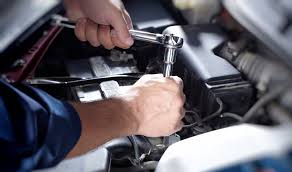Common Auto Repair Scams To Avoid
Finding a great auto mechanic can be as good finding the perfect babysitter for your children. Once you find one you like, you’ll want to keep them for as long as you have small children — or a car.
Like the babysitter who naps while your children are watching TV, you may occasionally get ripped off by a mechanic or auto repair shop. Whether it’s high prices, problems not fixed properly or repairs that don’t hold up, there are some auto repair shop scams that consumers should be aware of. Some may be innocent and may just be overzealous salesmen trying to make sure your car is extra safe, while others may be simple fraud.
Here are some auto repair scams to avoid:
Dirty fuel injectors.
A repair shop mechanic may tell you that fuel injectors need to be cleaned every 15,000 or 20,000 miles. Not true. Gasoline contains detergent to keep fuel injectors clean. Someone may show you a dirty fuel injector, but don’t believe that it’s yours. Check your owner’s manual, but most fuel injectors are recommended for replacement once a year or at 35,000 miles, and even that may be too often.
Used parts passed off as new.
If you’re paying for new parts, you should get new parts. Ask to see them before they’re installed. Check that they’re new, brand-name parts approved by the manufacturer, called Original Equipment Manufacturer, or OEM, parts.
Engine flush.
Spending $200 on an engine flush is wasted money on a service that’s not part of normal maintenance unless you’ve neglected your engine and don’t change the oil when needed. An engine flush gets rid of sludge in an engine, which is something your engine won’t likely need if you’ve taken care of your car. Look in the oil filler lid for deposits and other gunk. A flush could break loose such sludge that could get into the engine, though you’re unlikely to see such sludge buildup.
Nothing lasts a lifetime.
Don’t pay extra money for transmission fluid, filters, brake pads or anything else that is supposed to last for the car’s lifetime. A “lifetime” transmission fluid is only good for 35,000 miles, so don’t fall for the hype.
Frequent oil changes.
If you go to a shop that specializes in oil replacement for your car, you’ll likely get a reminder sticker to return at 3,000 miles. That may have been accurate 20 years ago, but cars now run better and don’t need oil changes as often. Most manufacturers recommend 5,000 miles for an oil change. Check your owner’s manual for details. Also make sure you’re getting high quality oil that’s recommended by your car’s manufacturer.

Common Scams to Watch Out For
AIRBAG FRAUD
Dishonest repair shops frequently use stolen, previously deployed and salvaged airbags to replace a customer’s deployed airbag. Shops pay very little for these airbags and then bill your insurance company for the retail value of a new one. Some unscrupulous shops will even attach a deployed airbag to the steering wheel of a vehicle that contains a non-deployed airbag, creating the illusion of a deployment and thereby increasing the insurance claim amount. Not only are you not getting the new airbag you deserve, but you may well receive an airbag that won’t work when you need it most.
BANDIT TOW TRUCKS
Be cautious if a tow truck driver you did not call arrives at the scene of an accident and tries to persuade you to allow your vehicle to be transported to a repair facility. These tow truck drivers often charge exorbitant fees and bring vehicles to dishonest repair facilities. Once a vehicle is at a facility, it can easily be held hostage with demands for an insurance company payment. The tow truck driver may also attempt to refer you to unscrupulous medical providers and attorneys who specialize in insurance fraud scams.
“BURYING” THE DEDUCTIBLE
Unscrupulous collision repair shops may offer to “bury the deductible” or hide the cost within the estimate for repairs so the insurance company ends up paying the deductible. One common way to bury the deductible cost occurs when a shop bills the insurer for original equipment manufacturer parts but instead installs less expensive parts or repaired, damaged or junk parts.

Steer Clear of Car Repair Rip-Offs
Auto repair complaints consistently rank among the top consumer grievances. So don’t get taken for a ride. Watch for these warning signs of unnecessary and overpriced service by mercenary mechanics.
Diagnostic dialect
Many rip-offs are the work of outright crooks who, betting that you (like most drivers) are clueless about what’s under the hood, knowingly try to sell unnecessary repairs. They snow you with terminology you don’t understand. But sometimes inflated bills come from car mechanics who don’t know what the problem is and replace various parts in hopes of finding a resolution.
Modern vehicles contain more computing power than the moon-reaching Apollo spacecraft, so you should insist on a high-tech check for dashboard warnings and other drive-impacting issues. This computerization removes a lot of the guesswork.
Oil change add-ons
Many repair shops barely break even on routine services like oil changes, so you can be confident that a mechanic will give your car a thorough inspection looking for other possible jobs. A common con that can pad a bill by hundreds of dollars is the “wallet flush.” The mechanic changes the radiator coolant and the fluids for your power steering, automatic transmission and brakes, when your car doesn’t need it. Many newer cars, for instance, have extended-life coolant that lasts up to 100,000 miles. Make the owner’s manual your guide to all scheduled maintenance.
Front-end fraud
Unless you notice handling problems, be suspicious if a mechanic says your car needs front-end work like an alignment or new ball joints, which offers free advice on car repairs. Why be suspicious? Most customers can’t easily locate or identify those parts. And with ominous warnings from the mechanic about steering loss, the repairs have a high scare factor. If your car seems to be driving fine, get a second opinion.

Repair Estimate Scams
Consumers who don’t get written repair estimates can suffer the consequences when they pick up their cars. This problem occurs when a shop provides a very reasonable quote when the car is dropped off, but at the end of the day, the consumer finds that the shop has raised the final bill considerably from the verbal quote. This may seem to be perfectly legal; since many mechanics find additional problems with a vehicle once work begins. Shop owners and mechanics have been known to leave the estimated amounts blank when they ask customers to sign repair authorizations. Later on they fill in an inflated amount or descriptions of problems after the consumer leaves the premises.
Maintenance Hook Schemes
Repair shops will advertise check-ups or preventive maintenance service at very reasonable rates. Unethical shops will use these maintenance specials to “hook” and deceive their customers. A simple oil change and lubrication process can turn into expensive and unneeded repairs. Some mechanics will even cause damage during an inspection to enhance their income by “discovering” new car repair needs.
Time to Fix Your Vehicle? Beware of These Tricks
Almost every driver hates dealing with any car repairs, especially when not knowing or having any handy mechanics in their circle. No matter where you live, there is always a small (or big) group of car repair mechanics who represent a source of worry as their deceptive practices can result in you paying thousands to fix a small issue. This article will tell you all about how you can avoid the repair shops that are only interested in thinning down your wallet.
ways you can avoid car repair scams:
1. Get Written Proof of Given Estimates
An extremely common trick that you might come across when interacting with a mechanic from a car repair shop is a very convincing first estimate of how much things are going to cost. More often than not, that’s the fishing bait they use to lure you into their future schemes.
They’ll give you a small amount at first and then raise that number as they work on your car, putting you in an extremely awkward position. They exploit the people’s inability to be rude by slipping in tiny “necessary” repairs along the way, and by the end of it, you’ll be paying triple the original price estimate. Getting proof that the mechanic stated a specific price would give you leeway to argue their future prices, prohibiting them from exploiting you in any way.
2. Look for Shops with a Good Reputation
Much like any other business offering a service, you need to continually be on the lookout for car repair shops that are known for their fair pricing. Asking a large number of friends to get a trusted opinion is crucial to finding a car repair shop that won’t try to play any games to get your money. Ask for their experience dealing with the shop, the quality of the work, their normal process of doing business, and, most importantly, their trustworthiness.
While it would be reasonable to stop after you get the trusted review of a friend, it wouldn’t hurt to take a few extra minutes to search for some other online reviews from other customers to double-check their validity and to put any doubts to rest. Third-party reviews are usually very trustworthy, so make sure you check a large number of them before heading to the chosen car repair shop.
3. Use Your Location to Your Advantage
Living in certain places can yield a lot of benefits, especially for car repair shops. Car companies in Asia are always in competition, and that can be extremely good for you. If you live in a country like Singapore, you’ll see a wide variety of car dealerships that offer car repair services for a very reasonable price due to high competition.
You’d need to be careful, though, as lower prices often mean lower quality of work, so you’ll need to choose a reliable workshop like Vin’s Automotive Group or any other company offering a workshop that contains car mechanics with a large number of years under their belt. These shops feature both reasonable prices and high quality of work, and they can reliably fix your car without a massive bill.
4. Don’t Fall for Emotional Manipulation Tricks
If there’s one thing car repair mechanics are proficient at, other than repairing cars, it’s manipulating you into getting other pieces of your car fixed. You’d send in your car for a simple task like replacing your AC filter and they’d look at your car in a horrified manner, asking you how long it’s been since you repaired your car with extreme worry on their faces.
They’d ask you questions like if you’re aware of how dangerous it is to ride your car at its current state and if you know that it’s extremely risky to continue operating it in this condition, but all these questions are meant to scare you into paying more money, even when it’s not necessary.